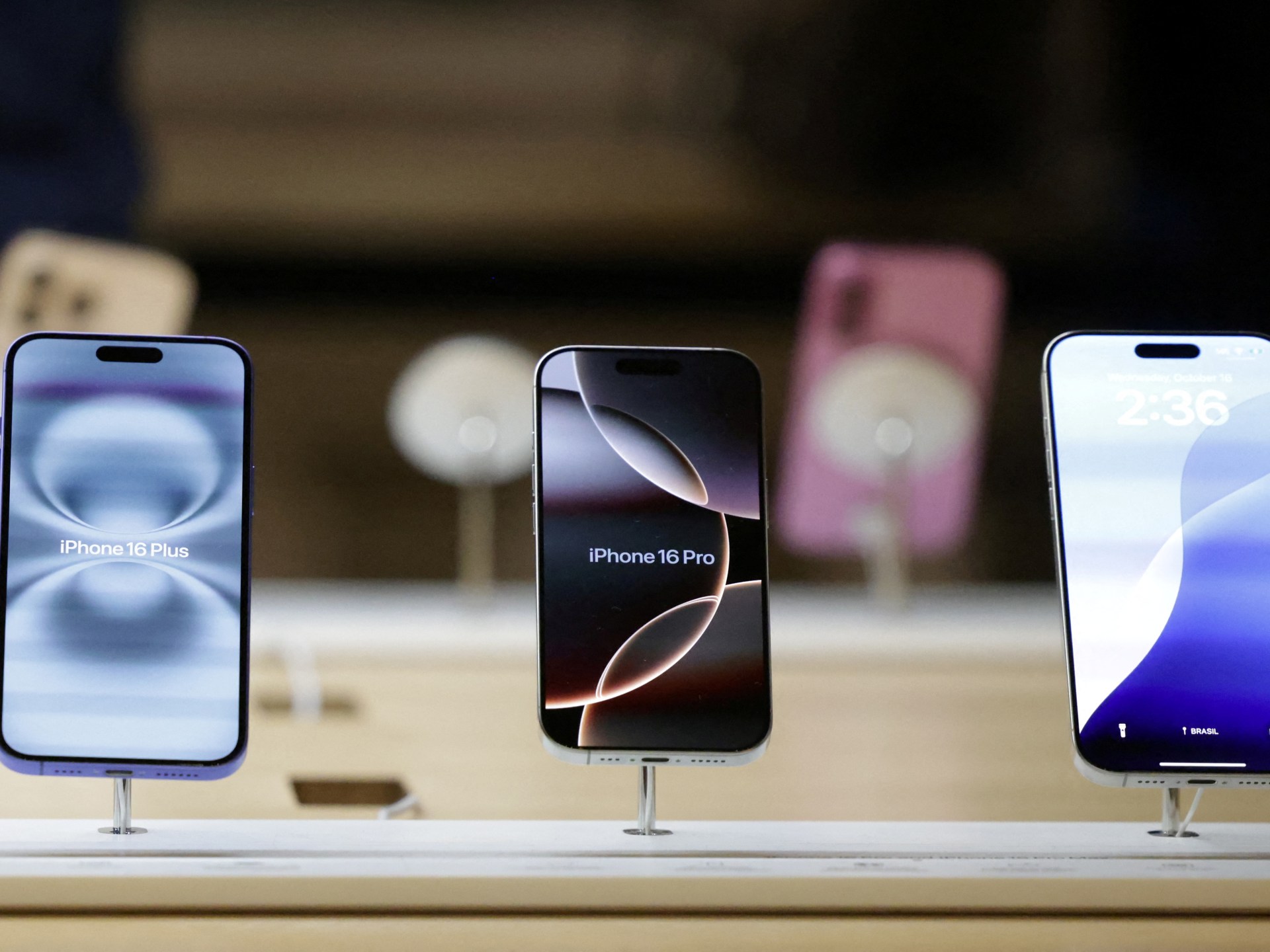Indonesia’s Apple and Google bans frustrate country’s tech fans | Technology

Medan, Indonesia – Winston, a doctor who lives and works in the capital of North Sumatra province, is a self-proclaimed Apple fan.
Winson, currently the proud owner of an iPhone 15, was looking forward to upgrading to the latest model, the iPhone 16, which was released in September.
However, Winston has reluctantly abandoned the idea since the Indonesian government banned iPhone 16 and Google Pixel sales in late October, citing the tech giants’ failure to comply with the country’s Tingkat Komponen Dalam Negeri, or TKDN, policy. Which requires the phones to source at least 40 percent of their parts locally.
“I was shocked by the Indonesian regulations regarding iPhones once, and once was enough,” Winston, who like many Indonesians uses one name, told Al Jazeera.
While Winston could buy an iPhone abroad to bring home — a relatively common practice that is legal as long as the phone is not resold — he has been hit hard by Indonesian regulations before.
“I bought the iPhone 11 in Singapore in 2019 because it was much cheaper than it was in Indonesia, about $250 cheaper in fact. A round-trip ticket to Singapore at that time was only $120. You can fly to Singapore and back to Indonesia On the same day, so it was more cost effective.
Winston used the phone without problems for about a year, until in 2022 the Indonesian government issued a regulation requiring all phones to be registered.
He said that despite registering his phone as required, the device suddenly lost signal one day and was unable to reconnect to the network, even with a different SIM card.
“I went to an authorized Apple seller in Medan because I thought there was a problem with the phone, but they just said: There is nothing we can do or suggest,” he said.
Burdened with an unusable iPhone, Winston, who had had no problems with his current iPhone 15, which he bought through an authorized seller, sold the device at a loss at a second-hand shop during a subsequent visit to Singapore.

Indonesia, the fourth most populous country with about 280 million people, is one of the world’s largest smartphone markets.
The archipelago was home to about 190 million smartphone users in 2022, according to market research firm Newzoo.
According to data from the Ministry of Industry, the country imported about 22,000 Google Pixel phones and 9,000 iPhone 16s in 2024, before the authorities announced the ban.
Smartphone shipments to Indonesia were dominated by devices manufactured by the Chinese companies Xiaomi, Oppo and Vivo, and the South Korean Samsung.
Abdul Solh, a lawyer in Medan, said the prohibitive price of the iPhone 16 for many Indonesians may explain why there was not more visible opposition to the ban.
“It’s a real shame, because iPhones are very popular and have a high user satisfaction rate in Indonesia,” Soleh told Al Jazeera.
“It would be better if the iPhone 16 is sold in Indonesia because there are a lot of enthusiasts here.”
Although Indonesia’s TKDN policy aims to support local industry, it may have unintended consequences, said Khairul Mahli, president of the North Sumatra Chamber of Commerce.
“As a member of the World Trade Organization with a trading industry operating between countries, it is good to protect our industries, but we also need to have checks and balances,” Mahli told Al Jazeera.
“One issue for the future could be that if Indonesia blocks sales of some products, other countries could do the same and stop accepting sales of Indonesian products in the international market.”
Mahali said that the government’s mission is to find ways to reduce damage to local industries that are less severe than a total ban on foreign products.
“We do not need to completely ban foreign sales, as the Indonesian market is large enough to absorb foreign products due to its large population of more than 270 million,” he said.
“We need to look at whether domestic production can keep up with consumer demand.”
Consumers should think twice before purchasing the latest iPhone model, especially through illegal distributors in the country, said Rio Priambudo, head of the legal affairs and complaints department at the non-profit Indonesian Consumer Organization.
“The consumer organization recommends that consumers do not try to buy the iPhone 16 by any means possible if it is banned by the government,” Priyampudu told Al Jazeera.
“If purchases are made illegally, it will negate the dimension of consumer protection that all customers should have.”
In an attempt to get out of the impasse, Apple pledged to significantly increase its investments in the country in exchange for lifting the ban.
In November, the California-based tech giant offered to invest $100 million in the country over two years, a 10-fold increase from an earlier pledge to pump $10 million into building an accessories and components factory in Bandung, West Java.

Despite the offer, the Ministry of Industry seemed unimpressed.
“From the government’s point of view, of course, we want this investment to be bigger,” government spokesman Febre Hendry Anthony Arif said at the time.
On November 25, Jakarta formally rejected the offer, with Industry Minister Agus Gumiwang Kartasasmita saying the offer did not meet Indonesia’s “principles of justice.”
He said Apple has invested larger sums in neighboring countries such as Thailand and Vietnam, including $15 billion for manufacturing facilities in the latter.
“Based on the technocrat’s assessment, the amount of investment did not reach the figure that we consider fair,” he said.
He added: “We want Apple to return to doing business here, but we need a fair solution.”
Meanwhile, Apple fans, like Winston, face the prospect of being without the latest models for the foreseeable future.
“I understand that the ban is for political reasons because Apple does not want to invest in Indonesia, and I stand with my government. But I will never buy an iPhone abroad again.”
https://www.aljazeera.com/wp-content/uploads/2025/01/2024-10-17T031429Z_1785130760_RC2VLAATPSPM_RTRMADP_3_TOTW-SMARTPHONES-1735695272.jpg?resize=1920%2C1440
2025-01-01 03:16:00





